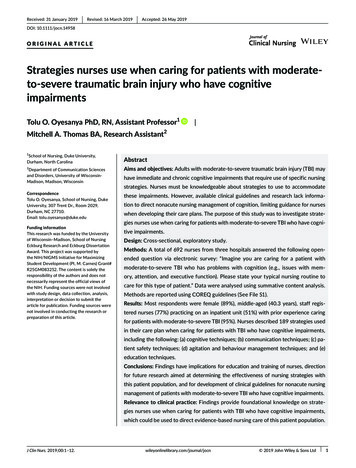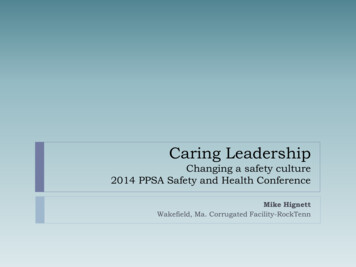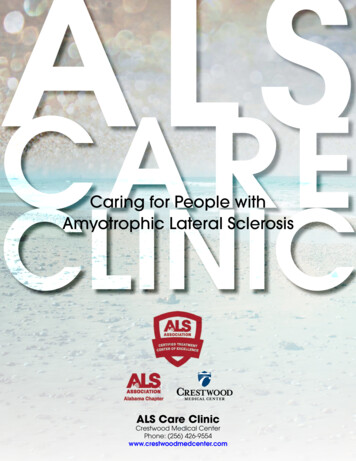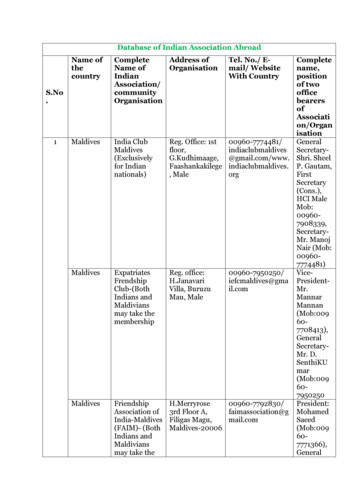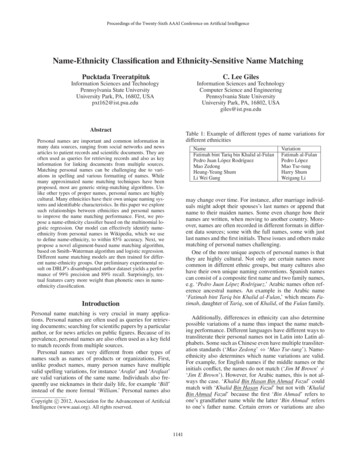
Transcription
Running head: CARING FOR SCHIZOPHRENIACaring for SchizophreniaNameInstitutionFebruary 09, 2019Instructor’s Name1
2CARING FOR SCHIZIPHRENIAIntroductionSchizophrenia is a health condition that impairs a person’s psychological and socialwellbeing. Typically, this illness exhibits positive signs such as paranoid delusions, andhallucinations (Mishra, et al., 2017). The patient may also show negative signs such as socialwithdrawal, loss of will, flattened affect, and loss of sense of pleasure. The focus of this paperis to illustrate how to take good care of a schizophrenia patient.Taking care of Schizophrenia PatientsSchizophrenia is a challenging condition to handle due to its complex andincomprehensible causes. The process of caring for individuals suffering from this conditioninclude combining medical treatment and psychological interventions, given the differentdegree that each option has to restore the wellbeing of the patient.Treatment optionsOnce a medical diagnosis, which include physical examination, tests and screening,and psychiatric assessment confirm that one is suffering from schizophrenia, he/she issubjected to a lifelong treatment that continues even after subduing the negative and positivesymptoms of the condition (Fitryasari, Yusuf, Nursalam, & Nihayati, 2018). The primaryreason for recommending a continued treatment process is to ensure that the condition is fullyplaced under the required control. In extreme cases, the patient might be recommended forhospitalization. As a care taker of a schizophrenia patient, it is worth to make follow up andensure that the patient’s treatment team includes at least a psychologist for the patient’spsychological wellbeing, a social worker who should ensure restoration of the patient’s lostsocial interaction, a psychiatric nurse who will be responsible for taking care of the patient,and a case manager to ensure appropriate coordination of the treatment team.Also Read: Buy Nursing Care Plan Paper Online
CARING FOR SCHIZIPHRENIA3The most commonly prescribed medication is antipsychotic drugs due to the beliefthat they stabilize the neurotransmitter dopamine of the brain. When administeringantipsychotic drugs, the primary focus is aligned with effective management of thecondition’s symptoms at the lowest dose. The desired results are achieved throughadministering different drugs in different doses interchangeably. At times, the treatment teammay be coerced to combine more than one drug, something that is normal, especially if thepatient’s condition resists the prescribed medication. Most patients tend to resist treatmentdue to the adverse effects brought about by antipsychotic drugs. However, it is advisable thatthe patient receives medication using other options, which include injections.Second-generation antipsychotics poses minimal risks as compared to firstgeneration. Some of the recommendable second-generation antipsychotic drugs includeAripiprazole, Asenapine, Cariprazine, and Clozapine. These drugs are expensive; hence, thereason some people prefer first-generation antipsychotic drugs such as Chlorpromazine,Fluphenazine, Haloperidol, and Perphenazine. One important note to make when going forfirst-generation medication is that they have the potential to make the patient develop tardivedyskinesia, which is a movement disorder that sometimes, tend to be irreversible.Psychological interventionAppropriate recovery of a schizophrenia patient relies on adequate provision ofpsychotherapy and psychosocial therapy during medication. Psychotherapy can be providedindividually by teaching a patient to differentiate between the reality and fiction. The patientcan also be provided with cognitive behaviour therapy, which is pivotal in enhancingthoughts and behaviour so that it becomes possible for the patient to handle imaginary voicesand hallucinations. Psychotherapy can also be provided in the form of cognitive enhancementtherapy, which works by improving the patient’s ability to identify social cues, enhancememory and be able to organize thoughts.Also Read: Buy Nursing Care Plan Paper Online
4CARING FOR SCHIZIPHRENIAPsychosocial therapy is provided to patients who show improvement duringpsychotherapy, prompting the need to help them learn and cope in the community. One of thepsychosocial therapy include social skills training to enhance the patient’s interaction andcommunication capabilities. Also, it might be essential to rehabilitate the patient so thathe/she can receive support in handling problems. Besides, it helps the patient to join self-helpgroups such as community care and outreach centres, which are essential in enhancing apatient’s social skills (Kerkemeyer, et al., 2015). A patient who might be experiencing anepisode of psychosis can be provided with coordinated specialty care. This intervention isused to manage the condition at its early stages, given that it is a team approach that isadministered as a combination of psychological therapies and drugs in a bid to achieveappropriate long-term outcomes.Assertive community treatment is another psychosocial intervention that providesproactive solutions to problems through personalizing treatment and care services, whichinclude appropriate tackling of life challenges that a patient might get exposed to. Also, apatient can be subjected to social recovery therapy, which can enable the patient to set lifeobjectives and gain a sense of optimism, as well as positive propensity about himself/herselfand towards others.ConclusionSchizophrenia is a condition that alters the normal functioning of a person’s mentalcapability. Specific causes to this conditions are not clear. However, various treatmentoptions are inexistence as illustrated in this paper. Given that medication alone might not besufficient to ensure positive recovery outcomes, it is blended with psychological interventionssuch as psychotherapy and psychosocial therapy as discussed in the essay. Appropriateadministering of these two options can improve a schizophrenia patient’s wellbeing.Also Read: Buy Nursing Care Plan Paper Online
5CARING FOR SCHIZIPHRENIAReferencesFitryasari, R., Yusuf, A., Nursalam, T. R., & Nihayati, H. E. (2018). Original Article: Familymembers’ perspective of family Resilience’s risk factors in taking care ofschizophrenia patients. International Journal of Nursing Sciences, 255-261.Kerkemeyer, L., Mostardt, S., Biermann, J., Wasem, J., Neumann, A., Walendzik, A., &Wobrock, T. (2015). Evaluation of an integrated care program for schizophrenia:concept and study design. European Archives of Psychiatry & Clinical Neuroscience,155.Mishra, A., Sai Krishna, G., Sravani, A., Kurian, T. D., Kurian, J., Ramesh, M., & Kishor, M.(2017). Impact of pharmacist-led collaborative patient education on medicationadherence and quality of life of schizophrenia patients in a tertiary care setting.Bulletin of Faculty of Pharmacy, Cairo University, 345.Also Read: Buy Nursing Care Plan Paper Online
Also Read: Buy Nursing Care Plan Paper Online Introduction Schizophrenia is a health condition that impairs a person’s psychological and social wellbeing. Typically, this illness exhibits positive signs such as paranoid delusions, and hallucinations (Mishra, et al., 2017). The patient may also show negative signs such as social




